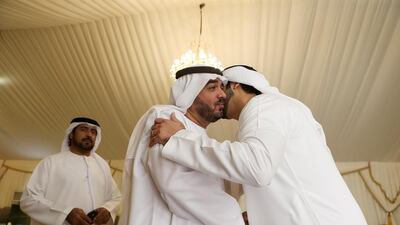The UAE is still mourning the death of its faithful sons who were killed in the line of duty in Yemen, even after the official three days of mourning has ended.
Losing such a large number of martyrs in one day is a new scenario that could possibly define the future of this young country. For the first time, the concept of martyrdom has been discussed in the UAE, among both intellectuals and other members of the community.
The classic definition of martyrdom implies the sacrifice of one’s life in the name of faith. In the regional context, the term was traditionally associated with the Islamic concept of jihad or “Holy War”, and sacrificing one’s life to achieve a religious victory. So anyone who dies in a religious war was described as a “martyr”.
However, the modern, and more secular, interpretation of the word includes other sacred causes. In the context of the nation state, it implies the sacrifice of one’s life for the nation, or the homeland.
Politically, the concept of martyrdom plays an important role in the construction of national identity. The UAE identity has been discussed widely in the last few years. For example, there were questions on what draws the people of the UAE together and what it means to be an Emirati.
Recent events are contributing to the development of national identity. The death of a large number of UAE soldiers brought Emiratis together and reinforced unity within society.
Such unity was demonstrated first in grief. Emirati society shared the sorrow and pain of losing a number of fellow countrymen.
Many citizens went to mosques to take part in the prayers for the dead. Many citizens also visited the funeral sites to pay respect and tribute to the fallen soldiers. Many of them felt obliged to do that even without knowing the dead personally or having any relationship to them or their families.
The unity was also seen in supporting the families of those who died in Yemen, with many citizens – among them the senior leaders of the country – visiting condolence tents across the Emirates to offer their support and to console the family members.
The people of the UAE also showed unity in supporting injured soldiers, as many citizens headed to blood banks and to other donation centres across the UAE as soon as the news came out to donate to those who might need it.
The Government announced plans to establish a Martyrs Family Affairs office at the Crown Prince Court, to ensure that the dead soldiers and their families will not be forgotten. A museum will be dedicated to their memory, which will house a special archive.
National consciousness is often forged in the toughest times. As former French prime minister Lionel Jospin put it, in a 1999 speech, national identities are elaborated on the basis of the “memories that are adapted and kept alive” by the people.
Memories of national martyrs play a major role in intensifying a citizen’s sense of identity. The devotion to their heroic memory is a significant way to maintain the community’s internal cohesion and social formation.
The recent deaths are also playing a role in changing Emirati people’s perspectives of war and peace, as the UAE plays an increasingly active role in the region.
In the early years after the establishment of the UAE, the country had a more non-interventionist foreign policy. Sheikh Zayed believed in Arab unity and in non-interference in the domestic affairs of other countries.
However, the UAE faces a very different reality today in a region that is suffering from more diverse, intense and violent wars and conflicts. The country had to follow a new approach in order to ensure its security and political interests.
The people of the UAE are realising now that sometimes peace and security can come with a high price. The current GCC intervention in Yemen, as columnist Hassan Hassan argued on these pages this week, was an inevitable response to the conflict in Yemen.
In his live interview during Abu Dhabi TV’s special coverage of UAE martyrs, Sheikh Abdullah bin Zayed, the Foreign Minister, said that the recent deaths had “touched every Emirati family” and gave them “more strength, unity, cohesion and determination to finish the mission, which the Saudi-led coalition had to undertake to protect our brothers in Yemen and legitimacy in the country”.
This year, before National Day is celebrated on December 2, the country will mark Martyrs’ Day on November 30 to remember and commemorate those who gave their lives in service of the UAE.
This will have a profound impact on the Emirati national identity, which is maturing as the years pass by.
aalmazrouei@thenational.ae
@AyeshaAlmazroui

